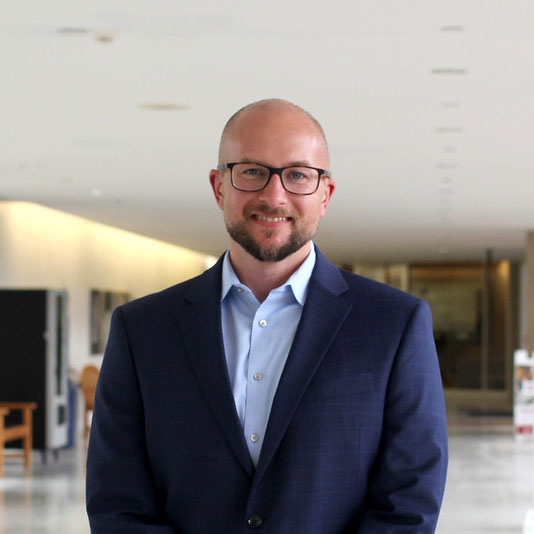Rust shared his goals for this position, his vision for University College, and what he is bringing to the table.
Q. What have you learned throughout your career that has helped you prepare to take on this role?
A. Between my time at NC State and then here at IUPUI, I've spent over 15 years working in the University College model. Through these experiences, I've learned two lessons that are critically important as I take on this role. One, as student success educators, we must be constantly engaging with and applying the latest research on student development and persistence. This is the only way to ensure we are focusing our work where and how it will have the most positive impact. Two, the University College model is most effective when it is grounded in cross-campus collaborations that benefit the entire campus. Given those lessons, I plan to emphasize the importance of investing time and energy into proven practices that equitably benefit students and to model the importance of engaging our allies in the degree-granting schools on efforts to model or scale up student success innovations.
Q. What goals do you have for both yourself in this position and for University College?
A. I hope that my work in this position, and really the work all of us here in University College, will be characterized by compassion for our students and colleagues; commitment to removing systemic barriers to diversity, equity, and inclusion; connectedness to each other and our colleagues around campus; communication that emphasizes transparency and trust; content expertise in the area of student success and persistence; clarity and consistency around our strategic direction; and a conscientiousness that our work be data-driven and assessed in this limited resource environment. If I can lead with these characteristics during this interim period, I'm confident that my colleagues and I will continue to be good stewards of the University College model.
Q. What aspects of University College and student success are you most passionate about?
A. Two aspects of the University College model and student success have been consistent points of passion for me: belongingness and exposing hidden curricula. On the belongingness front, University College excels at providing a place of community, a place where the whole student is seen and valued, a place where a large campus can start to feel small. I believe that a sense of belongingness is just as important for the students who call University College their academic home as it is for the professionals who devote their talents to this place. I've always felt surrounded by like-minded colleagues who want the best for our students in University College.
As for exposing hidden curricula, I believe that student success work is most effective when we are naming the unwritten rules for navigating the institution or career preparation; teaching students strategies to be resilient as they transition into, through, and beyond their education; and using those learnings to remove hidden barriers for future students. This drive toward transparency is at the heart of high-quality advising, career development, orientation, academic mentoring, and educational equity work.
Q. What are you most excited to work on after being appointed to this position?
A. Because I'm most familiar with the advising and career education units I've been leading, I'm excited to first engage more with the educational equity programs and the transition and mentoring programs to ensure I have a complete picture of the current strengths, needs, and strategic directions of our work. Heading into this summer, I'm very excited about the work all of our units are leading to prepare for what should be our newest-normal-yet since the COVID-19 pandemic struck. My colleagues and I are committed to this fall semester being a successful fresh start for the campus and our students.



